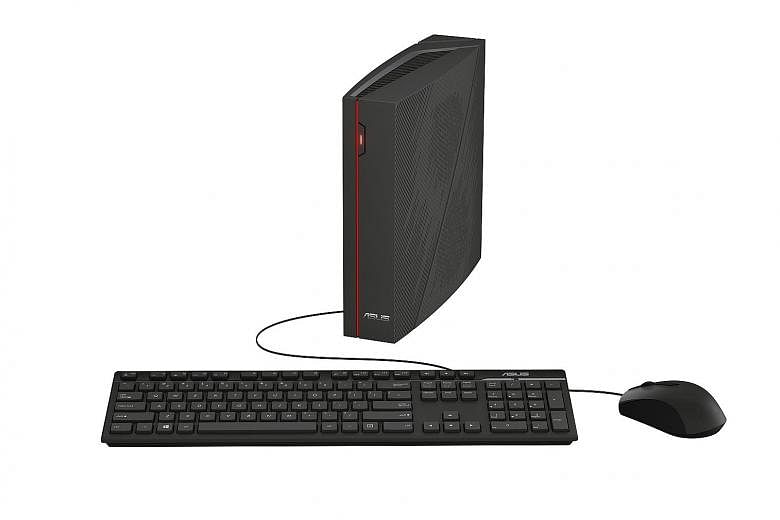PC vendors have been trying in recent years to create console-sized computers that can satisfy the gaming needs of PC users.
But the systems that have been produced are anything but cheap. However, the new Asus VivoPC X M80strikes a fine balance between performance and price. At the same time, it manages to keep a console-like footprint.
Its chassis is not as striking as Asus' other attempt at a console PC, the pricey ROG GR8. But, at 2.2kg, the VivoPC weighs less than all current consoles except for the PlayStation 4 Slim (2.1kg).
There is no optical drive, unlike consoles. It is also puzzling that Asus did not place any front USB ports on the VivoPC.
But these are minor quibbles. More importantly, the VivoPC is designed for virtual reality (VR) games and apps. It has the minimum Nvidia GeForce GTX 1060 graphics card required for the Oculus Rift and HTC Vive VR headsets.
-
TECH SPECS
-
PRICE: $1,198
PROCESSOR: Intel Core i5-7300HQ (2.5GHz)
GRAPHICS: Nvidia GeForce GTX 1060 3GB DDR5
STORAGE: 1TB HDD
RAM: 8GB
CONNECTIVITY: 4 x USB 3.1 (Gen 1), 2 x USB 2.0, DisplayPort, 2 x HDMI, Gigabit Ethernet, headphone and microphone jacks
RATING
-
FEATURES: 4/5
DESIGN: 3/5
PERFORMANCE: 3/5
VALUE FOR MONEY: 4/5
OVERALL: 4/5
In addition, the VivoPC lets you connect both a VR headset and a TV set or monitor at the same time because it has two HDMI ports.
However, Asus compromised on the CPU front by choosing a mobile chip, the Intel Core i5-7300HQ, instead of a desktop-class processor.
As a result, the VivoPC won't be among the top performers. With a PCMark Home 8 score of 3,451, which measures everyday computing tasks like Web browsing and office productivity, the VivoPC performs closer to that of a laptop than a desktop PC.
Its gaming performance is more impressive. In Doom, the VivoPC scored around 98 frames per second (fps) at 1,920 x 1,080 pixels and at Ultra setting.
In Crysis 3, the computer produced a smooth 65fps at Very High setting and 1,920 x 1,080 pixels.
To my surprise, the cooling fans were not noisy at all, even when the computer was running a game. Having experienced the occasional high-pitched whine of the fan on the Sony PlayStation 4 Pro, I was pleased that the VivoPC fared well in this department, which is important for a device built to reside at your home entertainment console.
The downside of a small form-factor computer from a PC vendor, as compared with assembling a similar system using off-the-shelf parts, is that there are zero to few options to expand or upgrade the system.
For instance, the VivoPC appears to use a custom motherboard with the graphics chip soldered on it, making it impossible to swop out for another graphics card.
But my biggest grouse is that Asus has equipped the local model with a single 1TB hard drive. This notebook-class hard drive provides a decent amount of storage, but is much slower than a solid-state drive (SSD). Installing games or loading apps will take longer.
However, Asus says that you can add your own SSD to the system. In fact, the VivoPC (US$799 or S$1,130) sold in the United States has a 512GB solid-state drive and a larger 2TB hard drive.
That said, the local pricing is still fairly reasonable, with Asus asking $1,198 for a VR-ready console PC.
• Verdict: An affordable and compact VR-ready system that runs fast enough for most games.


